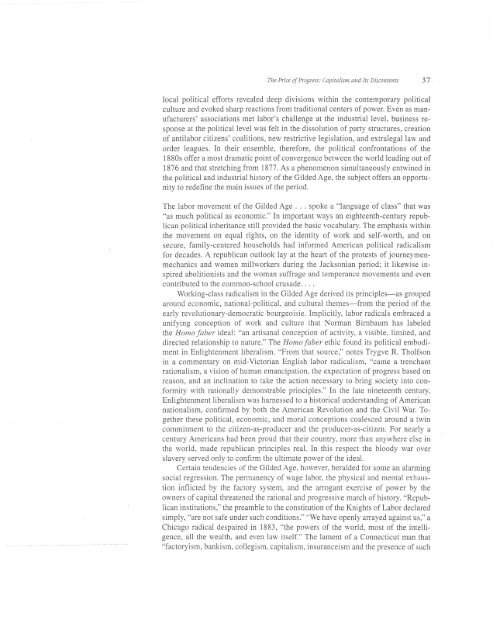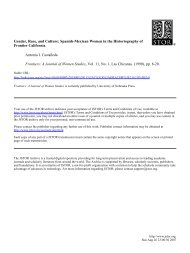Gilded Age 2 - Christine's History Pages
Gilded Age 2 - Christine's History Pages
Gilded Age 2 - Christine's History Pages
Create successful ePaper yourself
Turn your PDF publications into a flip-book with our unique Google optimized e-Paper software.
The Price of Progress: Capitalism and lts Discontentslocal political efforts revealed deep divisions within the contemporary politicalculture and evoked sharp reactions from traditional centers of power. Even as manufacturers'associations met labor's challenge at the industrial level, business responseat the political level was felt in the dissolution of party structures, creationof antilabor citizens'coalitions, new restrictive legislation, and extralegai law andorder leagues. In their ensemble, therefore, the political confrontations of the1880s offer a most dramatic point of convergence between the world leading out of1876 and that stretching from i 877. As a phenomenon simultaneously entwined inthe political and industrial history of the <strong>Gilded</strong> <strong>Age</strong>, the subject offers an opportunityto redefine the main issues of the period.The labor movement of the <strong>Gilded</strong> <strong>Age</strong> . . . spoke a "language of class" that was"as much political as economic." In important ways an eighteenth-century republicanpolitical inheritance still provided the basic vocabulary. The emphasis withinthe movement on equal rights, on the identity of work and self-worth, and onsecure, family-centered households had informed American political radicalismfor decades. A republican outlook lay at the heart of the protests ofjourneymenmechanicsand women miliworkers during the Jacksonian period; it likewise inspiredabolitionists and the rvoman suffrage and temperance movements and evencontributed to the common-school crusade. . . .Working-class radicalism in the <strong>Gilded</strong> <strong>Age</strong> derived its principles-as groupedaround economic, national-political, and cuitural themes-from the period of theearly revolutionary-democratic bourgeoisie. Implicitly, labor radicals embraced aunifying conception of work and culture that Norman Birnbaum has labeledthe Homo faber ideal: "an artisanal conception of activity, a r,isible, limited, anddirected relationship to nature." The Homo faber ethic found its politicai embodimentin Enlightenment liberalism. "From that source," notes Trygve R. Tholfsonin a commentary on mid-Victorian English labor radicalism. "came a trenchantrationalism, a vision of human emancipation. the expectation of progress based onreason, and an inclination to take the action necessary to bring society into conformitywith rationally demonstrabie principles." In the late nineteenth century,Enlightenment liberalism was harnessed to a historical understanding of Americannationalism, confirmed by both the American Revolution and the Civil War. Togetherthese political, economic, and moral conceptions coalesced around a twincommitment to the citizen-as-producer and the producer-as-citizen. For nearly acentury Americans had been proud that their country, more than anyrn'here eise inthe world, made republican principles real. In this respect the bloody war overslavery served only to confirn the ultimate power of the ideal.Certain tendencies of the <strong>Gilded</strong> <strong>Age</strong>. however, heralded for some an alarmingsocial regression. The permanency of wage labor, the physical and mentai exhaustioninflicted by the factory s,vstem, and the arrogant exercise of power by theowners of capital threatened the rational and progressive march of history. "Republicaninstitutions," the preamble to the constitution of the Knights of Labor declaredsimply, "are not safe under such conditions." "We have openly arrayed against us," aChicago radical despaired in 1883, "the powers of the world, most of the intelligence,all the wealth, and er,en law itself." The lament of a Connecticut man that"factoryism, bankism, collegism, capitalism, insuranceism and the presence of such



